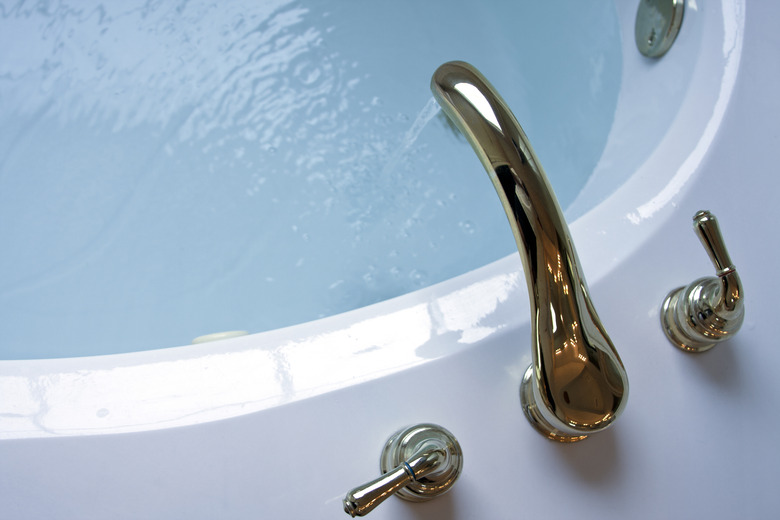Bathtubs That Retain Heat
We may receive a commission on purchases made from links.
Whether for little children who have had a busy day of playing or adults trying to wind down after a long day, a warm bath can start a relaxing evening and help promote a good night's sleep. To ensure you can enjoy long, warm baths in your bathroom, it is essential to choose a tub that retains heat effectively. Cast iron is the best bathtub material for retaining heat, according to Bob Vila.
Enameled Cast Iron
Enameled Cast Iron
Enameled cast-iron bathtubs are very durable, come in a variety of color choices. They also retain heat very well. Potential downsides are primarily their cost and weight. An empty tub can weigh more than 300 pounds. Before installing one of these tubs, it is essential to ensure your floor has enough support to hold the bathtub.
If it is, however, enameled cast-iron tubs do the best job at retaining heat. These tubs are also very good at resisting scratching, fading and chipping.
Acrylic and Plastic Tubs
Acrylic and Plastic Tubs
With their availability in a variety of colors, sizes and styles, acrylic bathtubs have the benefit of being lightweight and are considered to be durable. As long as acrylic tubs are properly insulated, they retain heat very well.
Acrylic tubs actually have many advantages, including their texture, their resistance to cracking and chipping and their resistance to mildew and harsh chemicals. The only drawback to choosing an acrylic tub is that they can be scratched and stained when exposed to the right material, such as hair dye.
Plastic tubs also hold heat very well, allowing you to enjoy a long soak without losing heat. Plastic tubs are an economical option, making them perfect for a starter home. Plastic is not as long lasting as most other tub styles, however.
Cast Polymer Tubs
Cast Polymer Tubs
Cast polymers, such as cultured marble, granite or onyx, are bathtubs that appear to be stone but have the capability to be molded like synthetic materials. These types of bathtubs are thicker than acrylic or fiberglass and hold heat well, without the necessary insulation of acrylic. Potential downfalls to cast polymer bathtubs are scratches or other damages to their gel coat, which is not as durable as acrylic bathtubs.
Soapstone, Brass and Copper
Soapstone, Brass and Copper
Known as a higher-end choice for a bathtub, soapstone is an excellent choice for heat retention. Although this type of bathtub is dependable for its ability to hold heat, its cost and limited style options can be drawbacks. Brass and copper retain heat very well and resist denting due to the thickness of the materials.
Tubs That Don't Retain Heat
Tubs That Don't Retain Heat
The benefits of fiberglass bathtubs include being affordable, lightweight and their availability of styles and colors. Unfortunately, fiberglass bathtubs do not retain heat well and are also subject to scratching easily and fading. While a cheaper option for a bathtub, fiberglass is not as durable as acrylic.
Enameled steel is lighter than cast iron, and it is a very popular tub material. While enameled steel bathtubs warm up quickly, they do not retain their heat. Enameled steel, unlike enameled cast iron, also chips easily.
